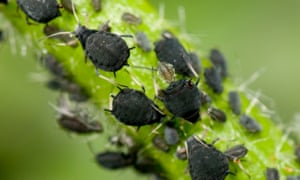https://www.theguardian.com/environment/2019/apr/01/insects-have-no-place-to-hide-from-climate-change-study-warns
Insects have ‘no place to hide’ from climate change, study warns
Analysis of 50 years of UK data shows woodlands are not havens, while changing emergence times damage nature and farming
Insects have “no place to hide” from climate change, scientists have said after analysing 50 years’ worth of UK data.
The study found that woodlands, whose shade was expected to protect species from warming temperatures, are just as affected by climate change as open grasslands.
The research examined records of the first springtime flights of butterflies, moths and aphids and the first eggs of birds between 1965 and 2012. As average temperatures have risen, aphids are now emerging a month earlier, and birds are laying eggs a week earlier. The scientists said this could mean animals were becoming “out of sync” with their prey, with potentially serious ramifications for ecosystems.
Researchers are increasingly concerned about dramatic drops in populations of insects, which underpin much of nature. In February it was said that these falls could lead to a “catastrophic collapse of nature’s ecosystems”, and in March there was further evidence of widespread loss of pollinating insects in recent decades in Britain.
Other studies, from Germany and Puerto Rico, have shown falling numbers in the last 25 to 35 years. Another showed butterflies in the Netherlands had declined by at least 84% over the last 130 years.
James Bell, at Rothamsted Research institute, who led the woodlands research, said: “Under global warming you would expect woodlands to have some protection for insects, a buffer against change. But we didn’t see that. It is the major surprise and is disturbing. There is really no place to hide against the effects of global warming if you are an insect in the UK.”
Another surprise was that insects and birds living in farmland are emerging later in the spring, not earlier as expected. “We can only assume this is to do with other, non-climate factors,” Bell said. The loss of wild areas and changing crop types could be among the factors, he said, along with declining food availability leading to delayed breeding.
James Pearce-Higgins, of the British Trust for Ornithology, said: “Birds are at the top of many food chains and are sensitive to the impacts of climate change on the availability of their insect prey.”
A separate new study found that populations of birds that rely on insects for food fell by 13% across Europe between 1990 and 2015, and by 28% in Denmark, which the scientists used as a national case study. The omnivorous birds assessed did not show a decline.
The UK research, published in the journal Global Change Biology, found that the shift to earlier emergence or egg-laying varied considerably according to the type of habitat and how far north the species lives. Aphids breed very rapidly and can adapt to changing temperatures quickly. Their first flight is now an average of 30 days earlier than 50 years ago. Birds, butterflies and moths are appearing one to two weeks earlier.
Bell said the changing timings were affecting farming, with aphids arriving earlier but potato crops being planted later due to wetter winters. This combination meant the aphids, which transmit viruses, were attacking much younger plants. “Plants are just like babies, with very poorly developed immune systems, so when a virus is transmitted into a young potato plant it has a much greater effect,” he said.
Jon Pickup, of the Science and Advice for Scottish Agriculture division of the Scottish government, said: “As pests, it remains a concern that aphid migrations are getting earlier at a dramatic rate and this piece of work shows us that signal across the UK very clearly.”
Bell said timing mismatches were also affecting wildlife. “For example, the leafing date of the oak tree determines when the caterpillars will appear, and that determines when blue tits that feed on caterpillars lay their first egg,” he said. “If they become desynchronised, it has cascading effects through the food chain, leading to fewer eggs, and this has been seen.”
During February’s exceptionally warm weather there were sightings of rooks nesting, ladybirds mating and dozens of migratory swallows arriving along the south-west coast, all more than a month ahead of schedule.

沒有留言:
張貼留言